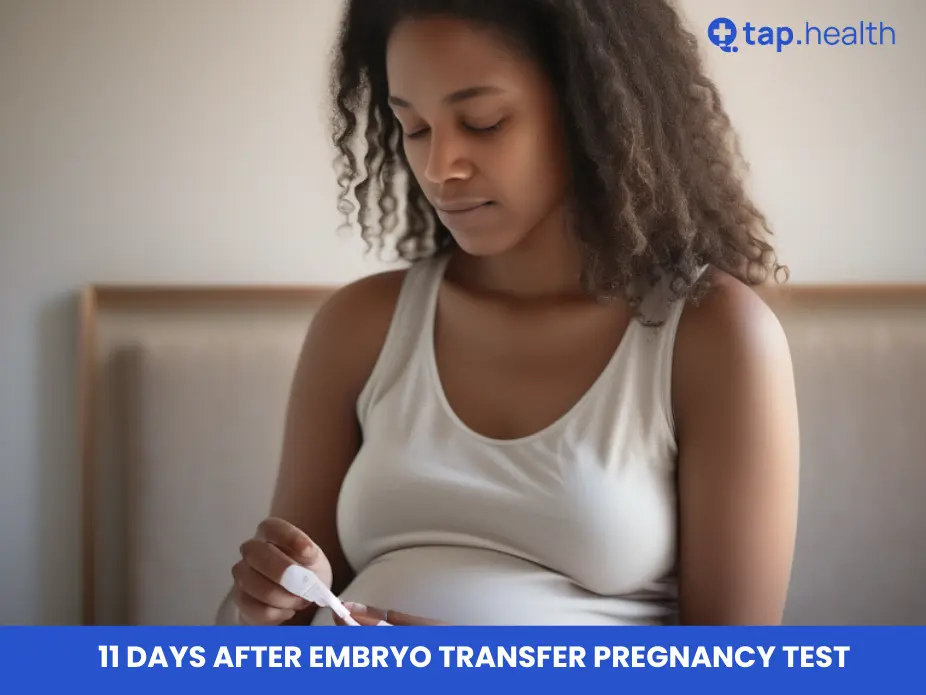The journey through in vitro fertilization (IVF) is a mix of hope, anticipation, and patience. One of the most pivotal moments is the pregnancy test taken 11 days after embryo transfer. This guide breaks down why this timing matters, what to expect, and how to navigate the emotional and physical aspects of this crucial stage.
Below, we address common questions about pregnancy testing post-embryo transfer, covering symptoms, hCG levels, test types, and next steps, all tailored to help you understand this phase of your IVF journey.
What Is the Importance of Day 11 in IVF?
The 11-day mark after embryo transfer is critical because it typically allows enough time for the embryo to implant in the uterine lining and start producing human chorionic gonadotropin (hCG), the hormone detected by pregnancy tests. Testing on day 11 balances accuracy and early detection, reducing the risk of false negatives that can occur if you test too soon.
Key Points:
- Implantation Time: By day 11, a successfully implanted embryo produces detectable hCG levels.
- Test Accuracy: Waiting until day 11 minimizes false negatives due to low hCG levels.
- hCG Production: This hormone, unique to pregnancy, confirms whether the embryo transfer was successful.
Testing too early may lead to inaccurate results, causing unnecessary stress. Always consult your fertility clinic for personalized advice.
What Happens in Your Body 11 Days After Embryo Transfer?
By day 11, the embryo may have implanted, triggering hormonal changes. The body begins producing hCG, and progesterone levels rise to support early pregnancy. These changes can cause symptoms, but they may also mimic premenstrual symptoms or result from IVF medications.
Common Symptoms at Day 11:
- Mild Cramping: Often linked to implantation or uterine changes.
- Spotting: Light bleeding may occur as the embryo embeds in the uterine lining.
- Breast Tenderness: Hormonal shifts can make breasts sensitive.
- Fatigue: Increased energy demands may cause tiredness.
- Mood Swings: Hormonal fluctuations can affect emotions.
- Nausea: Early morning sickness may appear in some cases.
Note: These symptoms are not definitive proof of pregnancy, as IVF medications can cause similar effects.
Why Is Timing Crucial for Pregnancy Testing?
Timing your pregnancy test is vital for accurate results. Testing too early (before day 11) may not detect low hCG levels, leading to a false negative. Waiting too long can delay confirmation and necessary medical follow-ups. Day 11 is often recommended as the optimal time for reliable results.
Factors Affecting hCG Detection:
- Embryo Type: Fresh embryos may implant differently than frozen ones, impacting hCG production timing.
- Number of Embryos: Multiple embryo transfers can lead to higher hCG levels if more than one implants.
- Individual Variations: Uterine lining thickness, hormone levels, and overall health influence implantation.
If you get a negative result on day 11, don’t lose hope. Slower implantation or lower hCG production can affect results. Consult your doctor for further testing, such as a blood test.
What Are the Types of Pregnancy Tests Available?
In India, two main types of pregnancy tests are used post-embryo transfer: urine tests and blood tests. Each has its benefits and limitations.
1. Urine Tests:
- How They Work: Detect hCG in urine, available as over-the-counter home pregnancy tests.
- Pros: Convenient, affordable, and private.
- Cons: Less sensitive in early pregnancy, with a higher chance of false negatives.
- Best Practice: Use the first morning urine for higher hCG concentration and follow the test instructions carefully.
2. Blood Tests:
- How They Work: Measure hCG levels in the blood, performed at a clinic or lab.
- Pros: Highly accurate, detect lower hCG levels, and provide quantitative results.
- Cons: Requires a clinic visit and may take longer for results.
- Best Use: Ideal for early confirmation or when home test results are unclear.
Recommendation: Your fertility specialist will guide you on the best test based on your situation. Blood tests are often preferred for their precision in early pregnancy.
How to Perform a Home Pregnancy Test Correctly?
Home pregnancy tests are popular for their ease and privacy. To ensure accurate results, follow these steps:
- Choose a Reliable Brand: Select a test known for high sensitivity to hCG.
- Test at the Right Time: Use the first morning urine on day 11 for the best results.
- Follow Instructions: Collect urine in a clean container, dip the test strip for the specified time, and wait for the recommended duration (usually a few minutes).
- Read Results Promptly: Check for a line or digital indicator. Even a faint line typically indicates a positive result.
Tip: Avoid over- or under-dipping the test strip, as this can skew results. Confirm positive results with a blood test for accuracy.
How to Interpret Pregnancy Test Results?
Interpreting pregnancy test results can be emotional, especially after an IVF journey. Here’s what to know:
Positive Result:
- What It Means: A line (even faint) or a digital “pregnant” result suggests hCG is present, indicating potential pregnancy.
- Next Steps: Contact your fertility clinic to schedule a blood test to confirm hCG levels and monitor pregnancy progression.
Negative Result:
- What It Means: No hCG detected, but this doesn’t always mean the IVF cycle failed.
- Possible Reasons: Testing too early, low hCG levels, or test sensitivity issues.
- Next Steps: Wait a few days and retest, or consult your doctor for a blood test.
Note: False negatives are possible, especially if implantation is delayed. Always follow up with your healthcare provider.
What Role Do hCG Levels Play in Pregnancy Confirmation?
hCG levels are the cornerstone of pregnancy confirmation. They rise rapidly in early pregnancy, doubling every 48-72 hours. A blood test (quantitative hCG test) measures these levels in milli-international units per milliliter (mIU/mL).
Typical hCG Levels:
- <5 mIU/mL: Not pregnant.
- 5-25 mIU/mL: Early pregnancy, possibly too early to confirm.
- 25-100 mIU/mL: Pregnancy likely, further testing needed.
- 100-1000 mIU/mL: Pregnancy confirmed, monitor hCG trends.
Why It Matters: Tracking hCG levels helps assess pregnancy health and progression. Your doctor may schedule repeat tests to ensure levels are rising appropriately.
How to Manage Emotional and Physical Health Post-Transfer?
The two-week wait (from embryo transfer to pregnancy test) can be an emotional rollercoaster. Managing stress and maintaining physical health are crucial during this time.
Emotional Health Tips:
- Acknowledge Feelings: Anxiety and hope are normal. Share your emotions with a partner, friend, or therapist.
- Relaxation Techniques: Try deep breathing, meditation, or gentle yoga to reduce stress.
- Stay Engaged: Distract yourself with hobbies, light activities, or social connections.
Physical Health Tips:
- Rest Well: Prioritize sleep to support your body’s recovery.
- Eat Balanced Meals: Focus on nutrient-rich foods to fuel your body.
- Light Exercise: Walking or stretching can boost mood and energy, but avoid strenuous activities unless approved by your doctor.
Support Systems: Lean on loved ones or join IVF support groups to feel less isolated. Professional counseling can also help navigate this phase.
What Are the Next Steps After a Pregnancy Test?
Positive Result:
- Celebrate Cautiously: A positive test is exciting but requires confirmation via blood tests and ultrasounds.
- Follow-Up Care: Schedule appointments to monitor hCG levels, confirm fetal heartbeat, and begin prenatal care.
- Healthy Habits: Maintain a balanced diet, stay hydrated, and take prescribed prenatal vitamins.
Negative Result:
- Process Emotions: Allow yourself time to grieve and seek support from loved ones or a counselor.
- Consult Your Specialist: Review the IVF cycle with your doctor to identify potential issues and discuss future steps, such as adjusting protocols or exploring other options.
- Stay Hopeful: Advances in reproductive technology offer new possibilities for future cycles.
When Should You Contact Your Doctor?
Reach out to your fertility clinic or healthcare provider if you experience:
- Severe pain or heavy bleeding, which could indicate complications.
- Concerns about symptoms or medications.
- Emotional distress requiring professional support.
Regular communication with your doctor ensures timely guidance and care throughout your IVF journey.
FAQs About Pregnancy Testing After Embryo Transfer
1. Is it normal to feel symptoms 11 days after embryo transfer? Yes, symptoms like cramping, spotting, or breast tenderness may occur due to implantation or IVF medications. However, they aren’t definitive proof of pregnancy.
2. Can stress affect pregnancy test results? Stress doesn’t directly impact test results but can influence overall hormonal balance. Relaxation techniques can help manage stress during the two-week wait.
3. What are the chances of a false negative on day 11? False negatives are possible if hCG levels are too low to detect, especially with delayed implantation. Retest after a few days or opt for a blood test for accuracy.
Conclusion
The 11-day mark after embryo transfer is a pivotal moment in the IVF journey. It’s when you can reliably test for pregnancy, balancing hope with the need for accurate results. Understanding the process, managing expectations, and caring for your emotional and physical health can make this waiting period more manageable. Whether the result is positive or negative, your fertility team is there to guide you through the next steps, offering support and solutions tailored to your needs.



